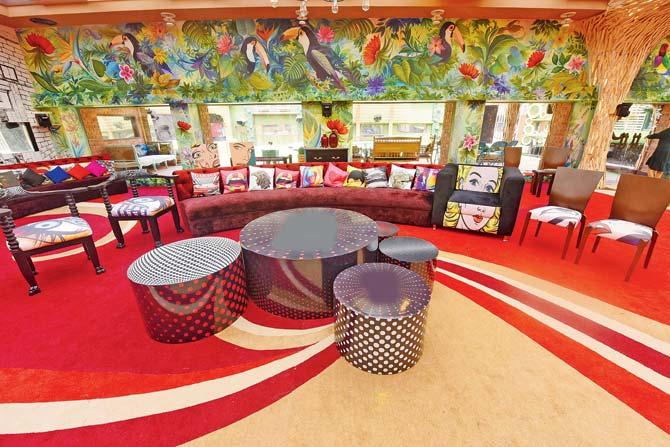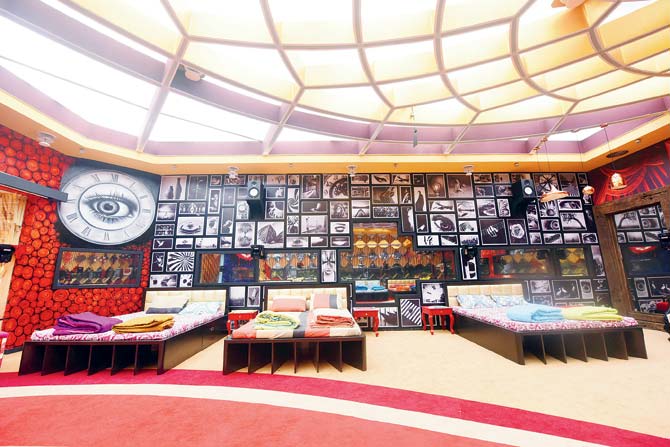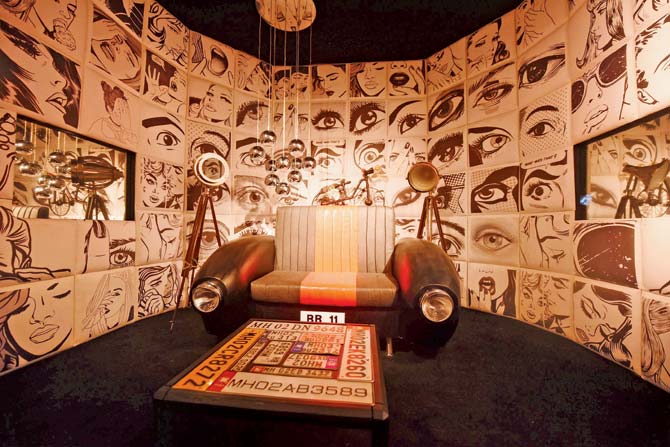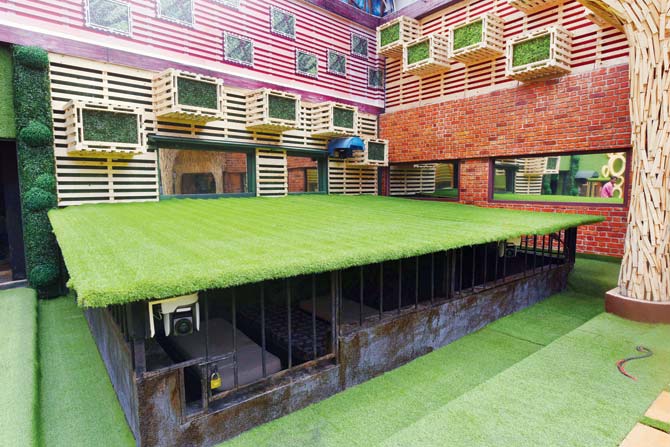mid-day gets inside the nation's queasiest home the 'Bigg Boss' house, with 13 strangers, for 24 hours, to report on what it’s like to live inside a TV set, with 90 cameras following you around

What could possibly be the equivalent of a quasi life-threatening, valiant war-reporting, for 'entertainment' journalism? And no, watching/reviewing a bunch of really bad movies doesn't even come close to volunteering oneself for 24 hours of physical confinement, with no access to a cellphone, or a clock, while 90 close-circuit cameras, and a microphone slung across your chest, record your every move, along with 13 people you barely know -- besides that they're all fine, entertainment field-reporters in their own right.

Salman Khan as the host on Bigg Boss
ADVERTISEMENT
I'm obviously talking about getting into the Bigg Boss house, permanently located in Lonavala -- that has been churning out self-invented celebrities (much before social media) in Indian households for a decade.
The show is in its 11th season already. It inevitably unites Indian TV voyeurs each year.
The concept is pretty simple. You lock up a dozen-plus people -- from different backgrounds, temperaments; a carefully curated set of oddball/quirky characters -- into a house for 15 weeks. You deny them any sort of contact with the real world. But for the booming voice of the 'Bigg Boss', who sets the rules of the house, and instructs them to do as he pleases.

The living room
The TV screen in our living rooms literally becomes an open window into their lives inside the house. The inmates compete against each other for both survival (cooking, cleaning, performing weird tasks), and popularity (making sure they don't get kicked out).
Every week a contestant gets voted out of the house.
What does it take to live in such a wilfully-designed, competitive hell-hole? Besides the lure of money, of course -- the longer you stay in the house, the fatter your pay cheque.
Frankly, organisers of this surreal trip were themselves surprised that I really wanted to check the Bigg Boss house out. I've my own socio-anthropological reasons. 'Kyunki har ghar kuch kehta hai (Every house says something)' -- this one, as I step in, screamed, "I'm gonna to screw your brains." The house is essentially a riot of jarring colours -- fake apples, paintings of green jungles, massive motifs of horses in glassy-silver, and multi-coloured shirt-buttons mounted on the wall, alongside unrelated pop-art in deep-red all over.

Common sleeping arrangements are made for contestants in the house
As for the inherent vibe, without getting into specifics, art-director Omung Kumar told us later about having turned the basic rules of 'vaastu shastra' on its head -- for where a kitchen should be, or the doors, and the like.
It's hard to find a quiet corner in this 19,400 square feet, 1 BHK (Bedroom, Hall, Kitchen). Unless you step into the front-yard, with fake grass, and a baby-pool. Or simply seek solace in human company. As 14 of us did -- naturally gravitating towards the large, circular dining table first, trying to break the ice, introducing ourselves (what we specifically do for a living, where we come from, etc.).
There was much initial thrill, and consequent bonhomie, I've to say. But this isn't a picnic. Was never meant to be. At some point, we've all similarly been on trains for 24 hours or so.

The confession room
But a journey, even if in a small compartment with strangers, for all its anticipation and promise, is different from the eventual destination -- which is what the Bigg Boss house in itself is. It doesn't take too long for the novelty to wear off; or even get to you.
"Patience is the key," we were told by the production crew while being briefed before entering. I agree.
Couple of hours in, three inmates among us had already been kicked out of the mansion -- based on a secret ballot held inside the Bigg Boss's 'confession room'. None of us took this eviction seriously. There're guys in the group who'd participated in this social experiment, held only twice before -- when the much-guarded Bigg Boss house has been thrown open for a journalistic experience. But those stays had lasted only few hours. Ones ousted had instantly returned. No such signs here. God knows what the Bigg Boss had in mind. This inherent unpredictability, equally true for how contestants might react, is partly the reason for the show's success.
As a pall of gloom and guilt naturally set into the otherwise excited group, I asked some inmates why they believed those three had to leave. One of the 'social outcasts' hadn't spoken much, or at all, in fact. The second seemed too far-out (which may actually work for TV audiences).

The kalkothri aka jail to imprison rulebreakers
The third, perhaps a regular Bigg Boss viewer, appeared excessively self-aware of how one should be inside the house -- with cameras and contestants around. I'm not sure if any of these reasons were true. At least in my mind, at no point did I feel particularly conscious of the cameras following every step. Maybe this comfort automatically flowed from a pre-knowledge that none of this was really being televised. So what if a 70-minute episode, edited from the 24 hours we spent in the Bigg Boss house, would eventually show up online. Who, besides the said tenants themselves, might really care for a day in the lives of 14 relatively unknown scribes, thrust on a screen, with no context at all?
I wondered if others would behave the same -- being terribly shy, or exceedingly exuberant -- without the cameras' prying eyes. Meeting them separately, after this experience, is the only way for me to find out.
At least one other fellow-inmate, who I'd known a little from before, seemed no different to me. I asked if he'd change if there were a competition (and the possibility of a prize) thrown into the mix. "Of course, I'd apply my mind, form groups, plan my move," he said.
But the lens -- that inevitably turns us into posers -- isn't all there is to it. There's also the inexplicably instinctive comfort one finds in revealing deepest secrets when placed among strangers. This became clear as I witnessed five inmates narrating the "most trying moments from their professional/personal lives" as a task handed to them by Bigg Boss.
You could sense a smiley, public face seamlessly peeling off to reveal men and women who'd been through a lot to get to where they are. A woman's teenaged story on fighting off goons every day in her Uttar Pradesh hometown almost drove us to tears. So did the other slightly tragic, but inspiring, tales.
Similarly, I didn't hold myself back later in the night, being 'interviewed' on my personal relationships, during what was simply a fun group-chat. I never thought this was ever possible (with me), without some alcohol involved. The hour-long Bigg Boss dare, on the other hand, was more
serious, partly physical, mostly outlandish. The five inmates -- who were made to go through these tasks (including, recalling their darkest memories) --had been chosen by the three people who had been initially removed from the house!
They held these five chiefly responsible for their exit. Bigg Boss allowed them to wreak vengeance upon any two of them, whose performances they didn't like very much. They were thrown into a make-believe, but a rather realistic, jail, in the front-yard.
Collectively outraged by this injustice, the entire group sat before the cage, chatting with the two social animals, who had been put behind bars. (The rest of the mansion is anyway a human zoo, created for public entertainment). This is when the Bigg Boss called me over to the 'confession room' to discuss at length what I really thought of his house, and the show.
I told him roughly about how I felt the world -- looking simultaneously for survival, and approval -- was itself a Bigg Boss house on a grander scale. Or perhaps the Bigg Boss house was simply a microcosm of many human realities -- politics, rivalries, power, and the Orwellian dystopia ('Big Brother is watching you') -- condensed into the temporary lives and times of a few guinea pigs, who we could all watch, and learn about ourselves from. There were some trust-issues involved, when I got back from the confession room. It'd been long. Nobody knew exactly what had gone on between Bigg Boss and I all this while. Some didn't believe when I told them what we'd spoken about. Also, I sensed soon enough, the fear of authority percolated into the human mind rather easily for Bigg Boss to stop being a game, but a seemingly frightening reality.
The three ousted inmates, who had been moved to the 'Padosi Ghar', next-door, did eventually return to the original Bigg Boss house. It's impossible to tell what time of the night that was.
I was then the jailor, given charge of the prison's key. The returnees had been told to get me to unlock the cell -- and free the two 'prisoners'.
Fearing some silly punishment or the other, I said I wouldn't -- until the Bigg Boss instructed me to do so himself. He eventually did!
The public policy of 'divide and rule' had been mildly attempted with this group quite early on anyway, with everyone having been asked to point out two things they didn't like about the person sitting next to them. It's hard to take such things seriously from/about people you hardly know.
But what about a person who has been collectively proclaimed a 'social pariah' by the same group -- that had shown her the door in the afternoon -- and to which she had rejoined at night?
So what if this is just a game? She had apparently watched a live footage sitting in the 'Padosi Ghar', where one of the inmates had allegedly called her "unimpressive." I'm sure that was a joke too. Maybe not to her. At dinner, quite out of the blue, she began pouring out her pain. The tu-tu mein-mein lasted over a couple of hours -- past midnight, for sure.
If I were watching this episode on TV, I'd automatically assume this altercation is scripted. This was unimaginably for real, and possibly how humans might behave, when they're hurt -- and let alone contact with the outside world, there are no means to distract the mind indoors, either (no books, TV, cellphone, or real friends). I still think her public reaction was rather silly. But that's another matter.
What else did I learn about myself, or 13 others, in a laboratory condition -- that is pretty much the opposite of 'vipasna', given that social isolation had instead forced each to interact with the other? It's hard to immediately distil a pretty overwhelming
experience. Or look in so instantly as an outsider.
But some of my basic observations did confirm what I've often assumed about groups of desi unknowns. Foremost, that they often organically split themselves between genders first -- the men intuitively huddle up towards the men; likewise, the women. This segregation (although transient, in this case) began while we were still at the waiting room, seeking entry to the house.
Language is another barrier that naturally splits a group. In the Indian scenario, where the Hindi-English divide denotes more than language alone, it wasn't surprising to even sense subtle resentment between the sets of inmates comfortable with one language over the other --although speaking strictly in Hindi is the Bigg Boss house-rule.
Above all, my stay possibly proved a personal theory -- that the most under-rated human distinction is whether you're intrinsically a 'morning' or a 'night' person. This isn't to suggest one's better than the other --only very different, depending on the time of the day. Having had an exhausting late-night, chatting up with a few, while a fair portion of the group had slept off, I was jolted from my sleep in the morning with loud-speakers blaring the Daler Mehndi Bhangra song, Ho Gayi Teri Balle Balle.
I could literally kill someone for doing this. I saw a couple of inmates dancing to the song on their mattresses instead. I was glad this was my first and last morning in the house. Coming back to how far you'd go as a journalist to serve the reader, I did eventually step out of the Bigg Boss war-field, wounded, like a brave soldier; with a deep gash in my bleeding arm, that the in-house doctor attended to, with six quick stitches. You may not be particularly in awe of how I got injured -- playing 'pakdam pakdae' (tag) in the living room! Bigg Boss bid farewell to the group telling them about how everybody was leaving his house with 'yaadein' (memories), while I was with a 'nishaani' (a mark). Scarred for life, huh?
 Subscribe today by clicking the link and stay updated with the latest news!" Click here!
Subscribe today by clicking the link and stay updated with the latest news!" Click here!







